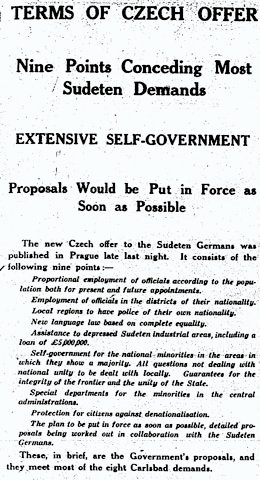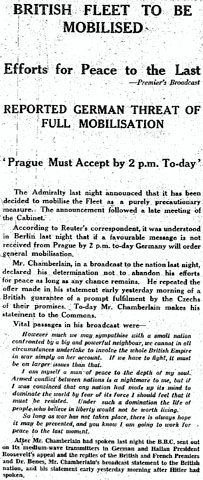
As indicated when he returned from Munich last week, Chamberlain is to fly back to Germany to meet with Hitler a second time. (Above headlines are from The Times, p. 10.) This time, they are meeting at Godesberg, a spa town in the Rhineland. Chamberlain will take the Anglo-French plan to Hitler, which may be a problem, because the Czech attitude to it is now characterised as 'Neither acceptance nor rejection'. It seems that the Manchester Guardian's scoop of yesterday was somewhat premature, for a later message from the Czech government was much more equivocal, asking for revisions to be made to the plan. France and Britain are pressuring Czechoslovakia to prove 'a more definite reply to the Anglo-French proposals', so that the Prime Minister and the Führer will have something to talk about.
The Czechs aren't the only ones with doubts about the plan to transfer parts of the Sudetenland to Germany. (Though they are understandably more concerned than most!) The Paris correspondent of The Times reports (p. 10) on the mixed reactions in France, quoting the socialist leader Léon Blum as an exemplar:
Whatever may happen, the consequences will be far-reaching in Europe and in France. War has probably been averted, but in such conditions that I, who have never ceased to strive for peace, who for many years past have sanctified my life to its cause -- I can experience no joy, but feel myself divided between a cowardly relief and shame.
Though the correspondent acerbically suggests that some of the criticism comes from those who would be the first to withdraw it, if they thought it might have any effect. That is, they are being brave after the fact.
Yesterday, the Manchester Guardian suggested that business opinion was in favour of the plan. Today, the London correspondent -- in a section headed 'Revolting City Tories' -- says (p. 8) that high finance has the opposite opinion, speaking of a 'rapidly growing revolt' in the City against Chamberlain. A 'well-known City authority' says that 'he would do anything, even stand as a Labour candidate, in order to protest'. At a Tory club, there was shock at the proposals. These men are solidly Conservative, yet here they are denouncing the government: giving Germany the Sudetenland is 'too weak for England', according to one.
This bellicosity is very interesting, given a story in the same paper (p. 13) about how the City would fare in wartime. Firstly, 'The City's location is well indicated to aircraft by the rectangular bend of the Thames at Waterloo', so businesses would have every reason 'to want to scatter away from the "City mile" in case of emergency'. For one thing, suburban train services would be cut to a minimum, so the banking houses would have a skeleton staff only, hopefully protected to some degree by anti-gas curtains and other ARP measures. Otherwise business will be conducted by those 'scattered outside London and linked up only by telephone'. Furthermore, it's clear that in wartime the government will want to restrict the mobility of capital and the ability to maximise profits. In short, war will be bad for the City, so why are bankers so keen for Britain to stand up to Germany?
The conservative press is doing its best to get people behind the Anglo-French plan. Here are a couple examples of some very slanted language. The Times has a leading article today (p. 11) which says:
To-day it becomes French as well as British policy to find, if it can yet be found, the way of agreement in place of blind and timid resistance.
So to stand up to Hitler over Czechoslovakia is to be 'timid'. And the Daily Mail has an article (p. 10) explaining that 'Europe is always changing' -- so that makes carving up Czechoslovakia ok then.
Finally, let's go to Geneva. The League of Nations has been sidelined by all the personal, bilateral diplomacy that's been going on during the crisis (and also because it has proved fairly toothless in previous crises). And this story is no different, because it has nothing to do with the crisis either. The Daily Mail reports that Captain Euan Wallace, Financial Secretary to the Treasury, yesterday recommended the following principles to the League's Committee on Disarmament:
1. Intentional bombing of civilian populations is illegal.
2. Targets which are aimed at from the air must be legitimate objectives and must be capable of identification.
3. Any attack on a legitimate objective must be made in such a manner that the civilian population in the neighbourhood is not bombed through carelessness.
This is an attempt to humanise aerial warfare by extending the laws of war on land and sea which have developed over time -- just the start, the final rules would be much more comprehensive. It arose out of British outrage (public and parliamentary) over bombing in Spain and China earlier in the year, as a leader in the Manchester Guardian notes (p. 8). But whether Wallace's principles will have any more success than any of the other attempts to limit bombing through international law seems doubtful. They certainly come too late for Alcoy, an industrial town in Spain which was bombed yesterday by Italian-made Savoia bombers. 12 people were killed, and 50 injured.
![]() This work is licensed under a Creative Commons Attribution-NonCommercial-NoDerivatives 4.0 International License.
Permissions beyond the scope of this license may be available at http://airminded.org/copyright/.
This work is licensed under a Creative Commons Attribution-NonCommercial-NoDerivatives 4.0 International License.
Permissions beyond the scope of this license may be available at http://airminded.org/copyright/.




